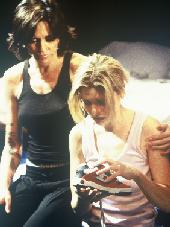SEARCH CurtainUp
REVIEWS
FEATURES
NEWS
Etcetera and
Short Term Listings
LISTINGS
Broadway
Off-Broadway
BOOKS and CDs
OTHER PLACES
Berkshires
London
LA/San Diego
Philadelphia
Elsewhere
QUOTES
On TKTS
LETTERS TO EDITOR
FILM
LINKS
MISCELANEOUS
Free Updates
Masthead
NYC Weather
Getting Into Heaven
By Amanda Cooper

Polly Draper and Gretchen Egolf
(Photo: Peter Jacobsen)
|
Cat Venita is an aged rock star still performing to packed Parisian halls. Though the opening scene of Polly Draper's show is the foreplay of a heterosexual act, there is much mystery-laden dialogue surrounding this fumbling scene. All becomes clearer as we then see Cat (played by Draper) make out with her band drummer and lesbian partner Rose. The play's complications continue to pile as we learn that these two women share a son, fathered by Jed, the man we first saw lie with Cat . . .yet the biological mother is her girlfriend Rose, who originally dated Jed's brother, who has died. And this is all within the first fifteen minutes!
Though the dialogue can be repetitive, and then often runs by ideas too quickly, the seemingly endless eccentricities of this group are expressed casually and smoothly. The humor interspersed within the harsh drama wavers between dry and silly, striking the best balance with Crystal (Barbara eda-Young), Jed's flaky, formerly psychic mother. Ms. Draper's true writing strength lies in her ability to create contrasting, complementary three-dimensional characters, even if they are not always performed to their full potential.
Gretchen Egolf plays Rose and cameos as the mysterious Rose look-alike nurse (a plot loose end) with impressive character range and believability. She quickly switches from earthy, experienced Rose to uptight, nerdy and naive Amber.
Barbara eda-Young as the hysterical Crystal is true comic relief, but at times her ethereal nature reaches a stereotypical plateau, squandering opportunities to show her more vulnerable side in regards to her "phantom caller. " James Badge Dale as the angsty white rapper/DJ and father, Jed, gives a raw, yet surprisingly sad and poignant performance. His love for Rose and desperation to leave his brother's looming shadow feels honest and deeply rooted.
Egolf and Badge-Dale together have wonderfully dark chemistry, making their pull towards and against each other palpable. Draper's portrayal of Cat wavered between an aging tough rock babe, and a washed-up impression of one. Though Draper pulled off the tattoos and leather pants, her need to still perform and her ability to perform is debatable. Cooper Pillot as Cat and Rose's young son was endearing, and his love of being on stage was easily apparent.
With the TVs, the back wall covered in a light bulb grid, and the visible lights on either side of the stage, the lighting and set design, by Junghyun Georgia Lee and Matthew Richards respectively, are in harmony, providing a collaborative feel for the multi-media aspects of this show. Consequently, the Brechtian influenced elements and scene changes are easy to warm up to, and, in the truest Brecht sense, soon alienating - activating our minds, not irking them. Jenny Mannis' costumes are apt and the music by Michael Wolff pushes the rock subtext beyond the ability of words. Claire Lundberg's direction is generally on target even though some high voltage dramatic scenes come off as piercingly awkward.
Death is a consistent theme throughout, but Heaven is only brought into the picture twice. These two instances feel too purposeful, and not applicable enough to the other conversations about those who are not still living.
Despite the tight performance and many quality attributes, the shaky aspects and loose ends add up to a Getting Into Heaven that's not exactly cloud nine. It would have been helpful to have a dramaturg to provide a third pair of eyes and ears, especially with the playwright doubling as the leading actress.
|
GETTING INTO HEAVEN Writer: Polly Draper Director: Claire Lundberg Cast: James Badge, Polly Draper, Barbara eda-Young, Gretchen Egolf and Cooper Pillot Music Composer: Michael Wolff Music Producers: Michael Wolff and Michael Levine Set Design: Junghyun Georgia Lee Light Design: Matthew Richards Costume Design: Jenny Mannis Sound Design: Fitz Patton Video by: Topiary Productions/Nara Garber & Ben Wolf Running Time: Two and a Half hours, with one intermission The Flea Theater, 41 White Street (Church and Broadway, three blocks south of Canal) 212/ 226-2407 www.theflea.org Wednesday - Saturday at 7pm with a 3pm Saturday matinee--$25 6/11/03 - 8/2/03, opening 7/2/03 Reviewed by Amanda Cooper based on 6/25 performance |

Mendes at the Donmar
Our Review

At This Theater

Leonard Maltin's 2003 Movie and Video Guide

Ridiculous!The Theatrical Life & Times of Charles Ludlam

Somewhere For Me, a Biography of Richard Rodgers

The New York Times Book of Broadway: On the Aisle for the Unforgettable Plays of the Last Century

6, 500 Comparative Phrases including 800 Shakespearean Metaphors by CurtainUp's editor.
Click image to buy.
Go here for details and larger image.




